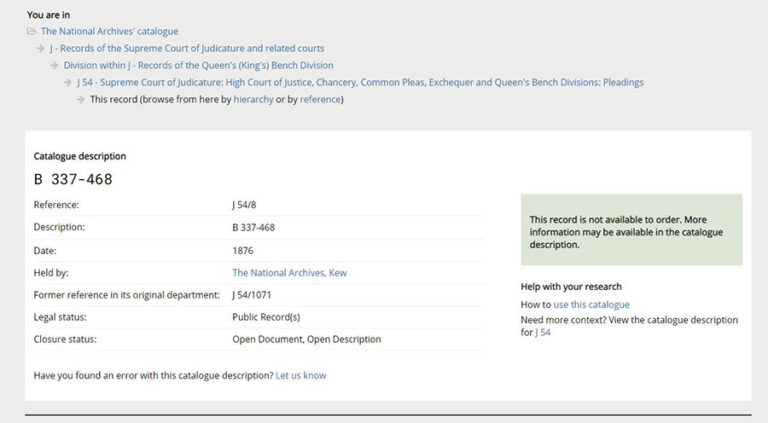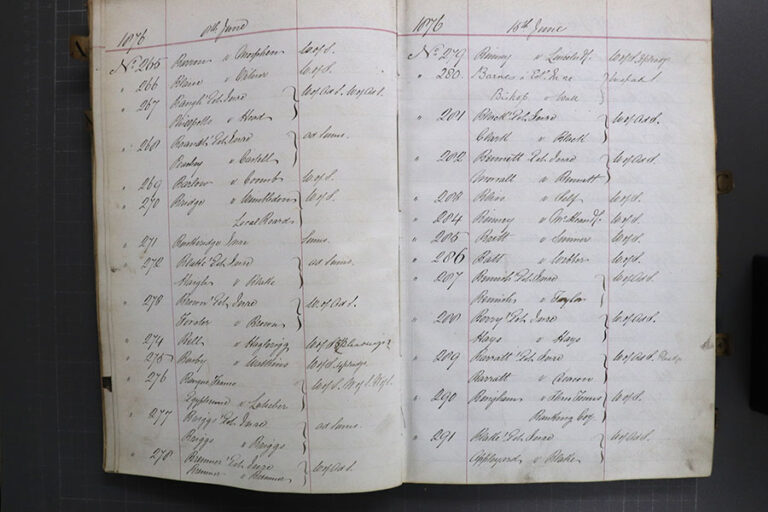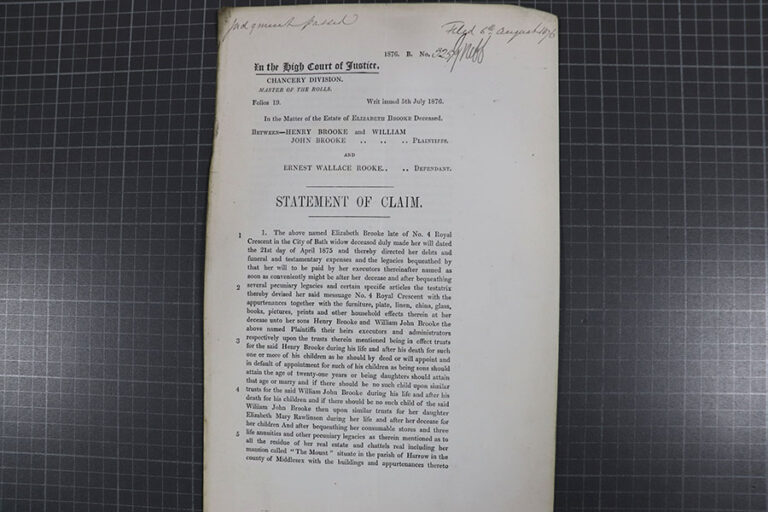As an archivist working at The National Archives, the first pandemic lockdown generated the need to undertake a cataloguing project that I could work on at home. I chose to catalogue the contents of the contemporary indexes for the legal pleadings for litigation cases commenced in the Chancery Division of the High Court in London. These indexes cover the years 1876 to 1879, and are on the open shelves in our Map and Large Document Reading Room.
The series of records that contain these records are under reference J 54. Presently the catalogue for this series, which includes complete records up to the year 1942, cannot be searched by the names of parties. See below an example of a page from the online catalogue for the year 1876. The first tranche of this cataloguing project will be entered into the online National Archives catalogue (Discovery) to allow it to be searched remotely.

The Chancery Division pleadings for the period 1876 to 1879, as you can see from the catalogue entry below, are arranged by year, initial letter of name of plaintiff (or in the matter of) and the case number. The arrangement changes for the years 1880 to 1942, when the records are arranged by date of filing of the documents shortly after judgment, under month, year and again initial letter of name of plaintiff. The latter period is also different because it also includes Queen’s Bench Division of the High Court cases. The type of cases dealt with by the Queen’s Bench include personal injury, debt, breaches of contract and libel cases.

The indexes created by the court officials provide the surname of the first-named plaintiff and the first-named defendant. They also give the surname of the deceased when a case is about their estate. Consequently, if there are multiple parties these will not be all mentioned. They also refer to the type of court documents that have been filed for each case.
The most common record is the Writ of Summons, which consist of pre-printed forms with the relevant information written in. These are referred to as Administration Summons when dealing with the estates of the deceased. A proportion of the writs of summons are supported by typed statements of claim which go into more detail about the claim.
Sometimes a Statement of Defence will be filed by the defendant. A few cases also include handwritten depositions which are witness statements. For the 1876 to 1879 period the outcome or judgment order for the cases are not included. However, the subsequent records in the J 54 pleadings series do provide the judgment orders. Otherwise for the outcome of a case you should refer to a separate series of records which, from 1876 to 1955, are in Entry Books of Decrees and Orders in J 15 series.
The Chancery Division records that I am cataloguing are dominated by cases involving decisions on how to distribute estates of deceased emanating from wills written by the same individuals. Sometimes these cases were brought many years after a will went to probate, often because of arguments on how to distribute an estate held in trust.
Typically they involved the executors of a will. They were not always party versus party disputes. The parties, usually relatives of the deceased, could collectively bring a case to enable the Chancery Division court to make a decision. An example of this is the case In the matter of the estate of Elizabeth Brooke – Henry Brooke and William John Brooke versus Ernest Wallace Rooke (J 54/7, no. 325). The parties asked the court to administer the real (freehold) and personal (moveable goods, cash, leasehold etc.) estate of the deceased who left a will.
A question arose over whether the legacies were chargeable on the real estate. This refers to legacy duty or tax that needed to be paid by the beneficiaries of the will. The property at 4 Royal Crescent in the city of Bath is described as a property of considerable value. The nominal defendant submitted a statement of defence admitting that the statement of claim of the plaintiffs were true.

There also a number cases appointing guardians. The person wishing the court to appoint him or her guardian to a child would also invariably ask the court to decide on the maintenance and education of the child. An example of a different type of court action involving a child is in the matter of Ellen Bans deceased an infant (J 54/7, no. 332). The father issued a summons to pay a legacy of annuities out of court, to be paid to him as the administrator of the child.
The Victorian era, with the increase in industrialisation, commerce and international trade, brought a corresponding increase in commercial legal disputes. For example, in my cataloguing I find mention of Birmingham Small Arms Company, South Wales India Rubber Company, British Farmers Pure Linseed Cake Company Limited, The Sao Pedro (Brazil) Gas Company and United States Rolling Stock Company. There are also a number of disputes involving the railway companies.
A good example of a Victorian commercial dispute that I found is in the case Augustus Baumgarten (trading as Brant and Company) versus Thomas Grobecker (trading as Barber and Company) (J 54/8, no. 433). The plaintiff, who was a chemist and druggist of Oxford Street, London, compounded a preparation which he believed would be of great medicinal value called ‘Invigorative Wervine Essence’. He had an agreement with the defendant to advertise and sell the product. The defendant proposed to purchase the rights of the plaintiff but abandoned the scheme and stopped payments to him. Baumgarten then saw an advertisement claiming the essence was prepared by the company of the defendant. The summons of the plaintiff includes an injunction to stop the advertising and a damages claim. In his statement of defence, Grobecker disputes that the plaintiff has sole right to the words ‘Invigorative Wervine Essence’ and disputes that the plaintiff kept secret the recipe.
This blog post was written for Catalogue Day 2020 at The National Archives.
